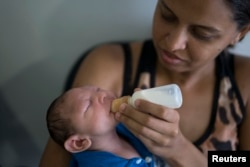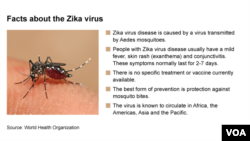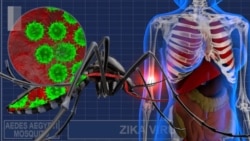The World Health Organization is appealing for $56 million to fund a Global Action Plan to combat the Zika virus, which is spreading across Latin America. The virus is suspected of causing microcephaly, or brain damage in babies and Guillain Barre, a neurological disorder.
The World Health Organization strategy focuses on mobilizing and coordinating the abilities and expertise of the agency’s many partners to help countries tackle the Zika virus.
This includes increasing surveillance of the Zika virus and the disorders that could be linked to it, controlling the spread of the mosquito that carries the virus and providing information to communities so they can take measures to protect themselves.
The strategy also calls for ensuring medical care to those who are infected and to fast-track research and development of vaccines, diagnostics and therapeutics.
Global strategic response
WHO spokesman Christian Lindmeier tells VOA the new emergency plan is an important part of the international response to control the spread of the Zika virus.
“This is a very important tool we have to respond very flexibly and quickly and to bring us all the partners on board and combine expertise as quick as necessary,” he said.
The Zika virus was discovered in Uganda in 1947 and has spread from Africa to other regions. The infection is mild and is not life threatening.
But Lindmeier says the possible association of the virus with microcephaly and Guillain Barre is very worrisome. He says it is the suspected linkage that has prompted the World Health Organization to declare Zika a public health emergency of international concern.
“This is something we see in larger numbers now and a few more countries, up to eight, have been reporting Guillain Barre. Now one has been reporting microcephaly, that is Brazil. And, here, of course, we need to fully establish what the possible links are between Zika and these diseases and anomalies and how we can break into those links,” he said.
The WHO says it expects to know within the next few weeks if the Zika virus and microephaly are linked . It says a Zika vaccine will not be available for at least 18 months.
Unorthodox tools
On Tuesday the organization said countries dealing with Zika outbreaks should consider unorthodox tools, such as genetically modified mosquitos, to halt the spread of the virus.
The Zika virus is transmitted primarily by the Aedes aegypti mosquito.
Both the Cayman Islands and Panama have had some success in releasing genetically altered male mosquitos that cannot produce viable offspring.
But environmentalists caution against using altered mosquitos, saying the long-term effects of killing off an entire insect population is unknown.
Blood donations
Also Tuesday, the U.S. Food and Drug Administration recommended people who have had potential exposure to Zika put off donating blood for at least four weeks.
They include people who show any symptoms of Zika, anyone who has traveled to a Zika-stricken area, and those who have had sex with someone who lived in or traveled to one of those countries in the last three months.









